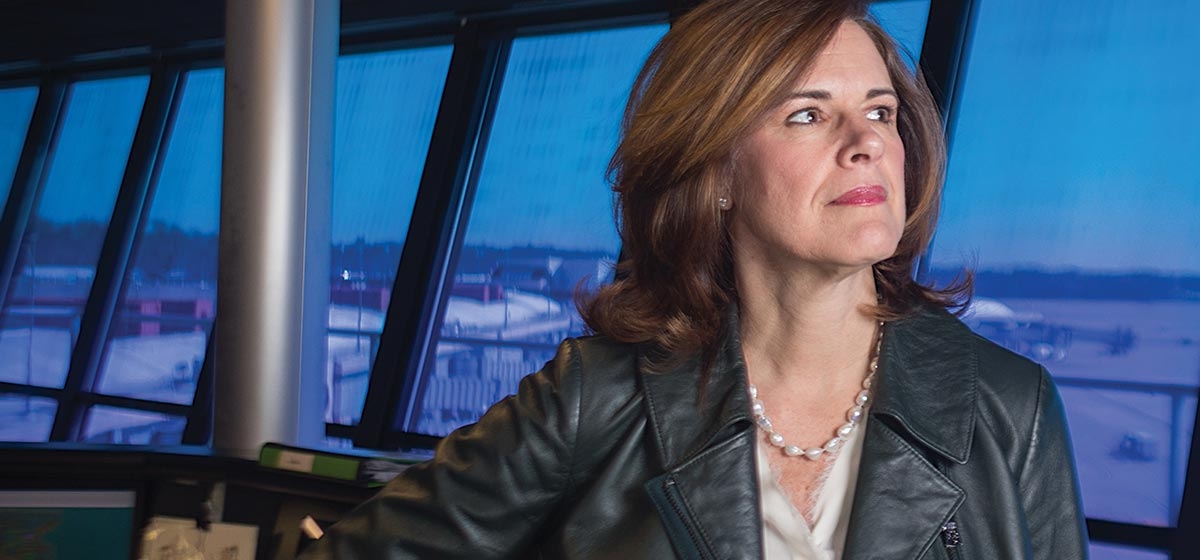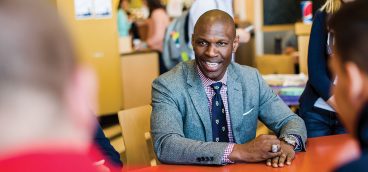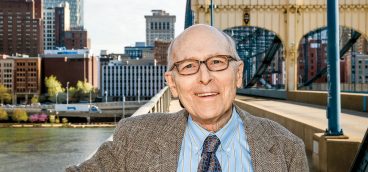Christina Cassotis, Allegheny County Airport Authority

I grew up in Southern New Hampshire in essentially a suburb of Boston. My mother was a homemaker, as many women were back then, and my father was a commercial airline pilot for Pan American World Airways, having been a U.S. Marine fighter pilot during the Vietnam War.
I’m the oldest of four kids: two boys; two girls. When I was young, we moved to Hong Kong for a year, after which we lived in Connecticut before settling in New Hampshire. From the age of 5 until 18, I lived in a comfortable, middle-class home with a swimming pool.
Pan Am was not a domestic carrier, so much of my father’s professional life was spent flying to places that sounded exotic and exciting to me, and he would return with amazing stories of different cultures and people. During the long layovers they used to have in those days, my dad spent a lot of his time discovering the foods of the regions he visited. Once home, he would cook some of the dishes he’d learned about for us, and when we invited our friends over for dinner, they’d ask if my father would be doing the cooking. If he was, they’d often pass.
Even though I love and respect my mother, I really wanted to be in aviation like my dad. But growing up in the 1970s, what were my options? I knew I didn’t have the aptitude to fly a plane and didn’t have the right personality to be a flight attendant, so I thought a career in aviation was not in the cards. Anyway, like most teenagers of my generation, I went off to college, to the University of New Hampshire, but wasn’t successful there. In fact, I was asked “not to return” after my sophomore year. It seems my grades were not the kind that inspired confidence from anyone at UNH. But my “failure” was deliberate. You see, I had always wanted to go to Dartmouth, an Ivy League university, but my father simply refused to pay for it.
After leaving UNH, I spent a year writing for a lifestyle magazine in southern New Hampshire called Manchester Magazine because I thought I wanted to be a writer. I went in and said, “I’ll work for free,” and they said, “Great.” So I started off as an intern and worked my way up to a paid position as the deputy editor, which was a big deal for me—and then I moved to Boston and became a waitress and bartender. It took a full six years for me to realize that it was important for me to get back into school somewhere, but I still didn’t know what I wanted to do.
I’m a second-generation American and, for my parents, education was very important. All my grandparents were blue-collar immigrants. My father, who grew up in a Greek community, went to first grade not speaking any English. His father was a leather worker. His mother worked at a lightbulb factory for Sylvania. Now, my mother was the daughter of Scottish immigrants. Her parents came over separately when they were in their 20s, met here and married. My grandfather on my mom’s side was a gardener, and my grandmother was a private-duty nurse for rich families.
My father had received a scholarship to attend MIT and was keen on seeing that all his kids were educated. When I decided to try college again, all he said to me was, “Good luck.” “What do you mean?” I asked. “I thought you were paying for college.” His response: “That was the offer, but you blew it the first time. We have three other kids to educate, so you’re on your own.” With that, I said to myself, “Well, if I’m going to have to pay for my education, then I’m going to focus on something I love.” So I worked during the day and went to school at night studying English at the University of Massachusetts at Boston which, in retrospect, was the right thing to do. The program was fantastic, and I loved it. I think everybody should get a liberal arts degree to learn how to think and write. Nevertheless, my father was happy I received a degree but skeptical of my major. He asked, “What are you going to do? Go to book groups for a living?”
I learned a great deal at UMass, but almost as much tending bar at a Beacon Hill “watering hole” where many state house reps, senators and lobbyists came for lunch and drinks. One day, one of the regulars asked me, “What’s a girl like you doing in a place like this?” I said, “I want to be a writer.” He replied, “I hear that the Division of Energy Resources needs a writer. Why not apply?” So I did and got a temporary gig as a communications writer for Energy. Then after three short months on the job, my boss said, “We’d like to extend your contract. Would you be interested?” I was not an employee. I received no benefits. But I had an office, so I said, “Sure.”
During my time at Energy, we released the “energy plan” for the Commonwealth of Massachusetts and Governor Weld’s press secretary liked my work enough to say, “You’d make a good communications director.” So I interviewed and, even though I had yet to finish my degree, was hired as director of communications for the Executive Office of Communities and Development. Anyway, I had been working there for only six months when a consultant that I had hired when I was at Energy called me and said, “I can add one more person at Massport, and I want it to be you.” At the time, I was being considered for the job of press secretary for the governor’s re-election campaign, so I had to ask myself: “Do I go into politics, or do I go to work at Boston Logan International Airport? I chose Massport, and worked there for five years before leaving to join the consulting firm SH&E where I spent 17 years climbing the ladder. Finally, after heading up the firm’s airport practice for some time, I decided to step down in 2014, just as I was graduating from MIT with a master’s degree from the Sloan School of Management. For several years, I had been studying for my MBA while working full-time, traveling, and raising a child.
Looking back, it was clear that my dad and I were cut from the same bolt of cloth, but we didn’t get along very well until I was older. His early death of lung cancer at 58 was difficult to take and I admit to feeling cheated by it. But my father never fell off the pedestal for me. He passed away just at the beginning of my consulting work, so much of my career in aviation happened after he was gone. In his final days, we tried to cram in a lot of soul-searching and heart-to-heart moments. Finally, he said to me, “Christina, I raised you and your sister like I was raised, but I raised your brothers like I wish I’d been raised.” When I got my driver’s license, my father wouldn’t let me drive until I could prove that I could change a tire. I think he wanted to make sure that my sister and I became independent and self-supporting. He was 15 when his father died, and had two younger brothers. His mother made things work, but her life was extremely hard without her husband’s income and support. My dad was determined to raise women who, no matter what, were going to be fine on their own. My uncles have told me many times, “Your father would have been proud of you, Christina.” I’m sure he would have been, given where I’ve ended up.
From my first day at Massport and on through my work with SH&E, I learned that airports are a major part of the aviation system. I came to see them as individual communities where people come together and then fan out to locations all over the world, only to come together again at airport “communities” elsewhere. I love airports and, throughout my career in aviation, I worked with facilities around the world in the area of competitiveness. How could they attract more air service? How could they better partner with their communities? One day, during my brief hiatus from work, I received a call from a headhunter telling me about a top-management job that had opened up at the airport in Pittsburgh. My first reaction was, “Do you need another name?” (I used to get called often for references.) He said, “No, we think you might be a good fit for the job because of your background.” I said, “But I’ve never run an airport.” “We know that,” he said, “but they have a real need to develop airline service.”
Curious, I traveled to Pittsburgh for the first meetings to get acquainted. The position was interesting and the people there seemed interested in me, so the job was worth considering. During my second round of meetings, I met with Allegheny County Executive Rich Fitzgerald and his chief of staff, Jennifer Liptak. I also met with a number of CEOs in the community, after which it became clear that the Pittsburgh airport was a diamond in the rough. It was just the place to apply all that I had learned in my career up to that point. Could we make an impact in the community by focusing on its airport and its potential? I thought so. My advantage was that I could look at Pittsburgh from the point of view of an outsider. (I had been here only once in my life, for a three-day conference.) What I quickly realized was that this community didn’t take its airport for granted. They may complain about the fares or certain gaps in service, but the Pittsburghers I met seemed to believe that their airport was important, and having it work well really mattered. I was totally convinced that there was solid community interest and support.
It was impressive to me how the city had deliberately and intentionally diversified its economy by shifting the region’s focus away from traditional heavy industry toward a host of modern businesses, such as hightech and energy. This, I knew, was going to make a big difference in how airlines would assess the Pittsburgh market. The region is developing industries that generate travel. It offers strong community support and boasts a relatively stable economy. The right pieces were already in place. My job would be to come in and assemble it all properly. And to accomplish this, I didn’t bring anyone with me. My team, aside from a couple of new hires, is the one that was always here, and with some tweaks to its vision, in no time, this place took off.
I started in January of 2015, and our success has been meteoric. When it comes to passengers, we grew 1.6 percent in 2015 over the previous year, and 2.2 percent in 2016. This past January, we posted 5 percent growth when compared to the previous January. Growth like this would certainly encourage more passenger airlines to consider our market’s potential. When I got here, 37 destinations were being served, nonstop. Now we’re at 68. Eight new airlines have been added. We now have three ultralow- cost carriers, and last November, two international airlines announced service: Wow Air and Condor. Year-round European service is back, and regional airline, OneJet, has chosen to base its operations here. OneJet flies to places within a radius of 700 miles—markets that will never again be served by traditional network carriers. It will play a role in our success, as will Southern Airways, which connects some of the smaller Pennsylvania communities— Johnstown, Lancaster and Altoona—to Pittsburgh. We have not yet settled on exactly what prescription will be best for our market, but this much is sure: we must expand service to the West Coast to support the tech community.
Airport management has traditionally been operations-driven. No airline is going to choose us because we have 75 gates. The reasons that they use or don’t use our airport have nothing to do with our facility—except if it doesn’t work well. In this regard, we have some work to do. Our facility must be upgraded for this region to grow. Today, we work out of a 25-year-old building with systems that are becoming increasingly obsolete. We have to remedy this, and I’m confident that we will. You know, most people don’t realize that our airport is self-supporting. No county taxpayer money pays for what we do. Our operations are funded by user fees: by people who park at the airport, and who eat or shop while there. We are also supported financially by the airlines that fly in and out of Pittsburgh, all of which pay landing fees and terminal rent. But this airport must keep up with the needs of our community or people will move elsewhere. They will choose not to locate their businesses here. This is what drives us. We are focused as a team on our responsibility to the economic viability of this region.
My husband and I have traveled the world, but we always came home to New England. We’re New Englanders, after all. So when I said, “I want to take this job in Pittsburgh,” he said, “What do you mean? Do we have to move?” He and I come from big extended families, of which we are often the center. Was I really going to pull up and move us to a city where we knew nobody? My son is an only child. How can I move him to a place where we have no support systems? This was a big family decision, but I made it clear: I was going to take this job. So for the first eight months, I commuted to allow my son to finish sixth grade in Maine, which is where we were living. When he and my husband finally came, I said to my son, “I don’t know at what age they put that special ‘homing chip’ in people here, but I can tell you that many people who are from Pittsburgh, at some point, come back. So there’s a good chance that you could spend much of the rest of your life here.” My husband had some trepidation at first but, within a few months, he found himself loving Pittsburgh. We’re very comfortable here. It’s really a great place to be.






